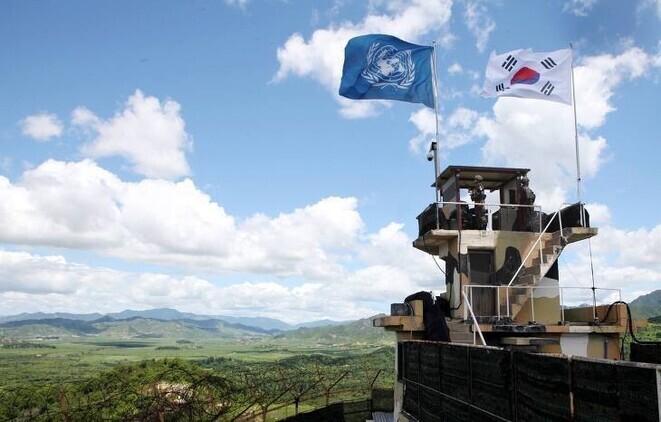hankyoreh
Links to other country sites 다른 나라 사이트 링크
UN Command only has authority to block military-related visits to DMZ, S. Korean Defense Ministry says

According to a new official and authoritative interpretation of the Korean Armistice Agreement of 1953 by South Korea’s Ministry of National Defense, the UN Command (UNC) only has the authority to decide whether to approve visits to the demilitarized zone (DMZ) when those visits are military in nature. The UN Command has been repeatedly criticized for not only overstepping its authority but for infringing on South Korea’s sovereignty by blocking nonmilitary visits to the DMZ, but this is the first time the South Korean government has taken a clear stance on the issue.
When Jeon Hae-cheol, a lawmaker with the Democratic Party, asked the Ministry of National Defense (MND) whether the UNC’s authority to authorize access to the DMZ only applied to military matters, the MND said on Sept. 30 that “the preamble to the armistice agreement specifies that it is ‘purely military in character.’”
Prior to this, the MND had avoided answering the question directly and had instead said that the UNC has authority under the armistice agreement to approve access to the DMZ and passage across the military demarcation line (MDL). That response has been understood as acknowledging that the UNC effectively has comprehensive authority on this matter.
Jeon also received an answer from the Ministry of Unification (MOU) on Sept. 30. “Since 2018, the UN Command has cited safety issues when refusing to allow people to visit the DMZ or cross the MDL for inter-Korean exchange and cooperation projects. Considering that the armistice agreement states that the UN’s authority is ‘purely military in character,’ these actions by the UN Command do not conform to the purpose of the armistice agreement,” the MOU said.
Working-level officials from related ministries including the MND, the MOU, and the Ministry of Foreign Affairs (MOFA) are currently meeting frequently to discuss how to secure the cooperation of the UN Command.
Taken together, the preamble of the armistice agreement and paragraphs 7-9 of Article 1 say that the UNC Military Armistice Commission (UNCMAC) can only decide whether to allow people to enter the DMZ for matters that are “purely military in character.” Nevertheless, UNCMAC has created controversy by blocking nonmilitary access to the DMZ on several occasions without offering any specific justification.
Some of the best-known examples of UNCMAC blocking South Koreans from crossing the DMZ are an inspection of the North Korean section of the Gyeongui Line in August 2018; taking reporting equipment to an inter-Korean civilian event at Mt. Kumgang on the Lunar New Year in February 2019; an inspection of Cheorwon, former capital of the state of Taebong, in June 2019; a visit to a reconnaissance post in Goseong by a South Korea-Germany unification advisory council in June 2019; a group of reporters who planned to accompany former Unification Minister Kim Yeon-chul on a trip to Daeseong village in August 2019; and carrying a ceremonial torch into the Joint Security Area (JSA) to commemorate the 100th Korean National Sports Festival in October 2019.
“The UN Command tells us to demonstrate safety [every time it refuses to grant permission to enter the DMZ], but it hasn’t provided any definite standards for that. The Defense Ministry already only approves access to DMZ sites that have already been confirmed to be safe from unconfirmed or displaced landmines, and the Defense Ministry already takes full responsibility for the safety issue,” a South Korean government official said. That suggests that safety issues are not a legitimate reason for the UN Command to block access to the DMZ.
“We are in discussion with the UN Command about setting up a system in which the government only has to notify the UN Command of visits except for those extremely unusual visits that are solely military in nature. Another option that we could look into is concluding a separate agreement,” Jeon Hae-cheol said.
By Noh Ji-won, staff reporter
Please direct comments or questions to [english@hani.co.kr]

Editorial・opinion
![[Editorial] Yoon must halt procurement of SM-3 interceptor missiles [Editorial] Yoon must halt procurement of SM-3 interceptor missiles](https://flexible.img.hani.co.kr/flexible/normal/500/300/imgdb/child/2024/0501/17145495551605_1717145495195344.jpg) [Editorial] Yoon must halt procurement of SM-3 interceptor missiles
[Editorial] Yoon must halt procurement of SM-3 interceptor missiles![[Guest essay] Maybe Korea’s rapid population decline is an opportunity, not a crisis [Guest essay] Maybe Korea’s rapid population decline is an opportunity, not a crisis](https://flexible.img.hani.co.kr/flexible/normal/500/300/imgdb/original/2024/0430/9417144634983596.jpg) [Guest essay] Maybe Korea’s rapid population decline is an opportunity, not a crisis
[Guest essay] Maybe Korea’s rapid population decline is an opportunity, not a crisis- [Column] Can Yoon steer diplomacy with Russia, China back on track?
- [Column] Season 2 of special prosecutor probe may be coming to Korea soon
- [Column] Park Geun-hye déjà vu in Yoon Suk-yeol
- [Editorial] New weight of N. Korea’s nuclear threats makes dialogue all the more urgent
- [Guest essay] The real reason Korea’s new right wants to dub Rhee a founding father
- [Column] ‘Choson’: Is it time we start referring to N. Korea in its own terms?
- [Editorial] Japan’s rewriting of history with Korea has gone too far
- [Column] The president’s questionable capacity for dialogue
Most viewed articles
- 1Months and months of overdue wages are pushing migrant workers in Korea into debt
- 2Trump asks why US would defend Korea, hints at hiking Seoul’s defense cost burden
- 3At heart of West’s handwringing over Chinese ‘overcapacity,’ a battle to lead key future industries
- 4[Editorial] Yoon must halt procurement of SM-3 interceptor missiles
- 5[Guest essay] Maybe Korea’s rapid population decline is an opportunity, not a crisis
- 6Fruitless Yoon-Lee summit inflames partisan tensions in Korea
- 7Dermatology, plastic surgery drove record medical tourism to Korea in 2023
- 8First meeting between Yoon, Lee in 2 years ends without compromise or agreement
- 91 in 3 S. Korean security experts support nuclear armament, CSIS finds
- 10AI is catching up with humans at a ‘shocking’ rate